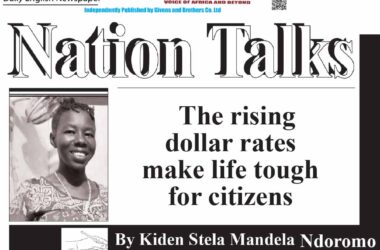By Gama Hassan Oscas
In the tumultuous realm of South Sudanese politics, a disconcerting phenomenon continues to undermine the nation’s stability and development: political prostitution.
This term aptly characterizes the frequent and often opportunistic shifts of allegiance by politicians and military personnel between the ruling Sudan People’s Liberation Movement-In Government (SPLM-IG) and various opposition parties, including the Sudan People’s Liberation Movement-In Opposition (SPLM-IO), the South Sudan Opposition Alliance (SSOA), and other political entities. Equally concerning is the fluidity with which individuals in military uniforms crisscross between the government and the opposition, often during the delicate phases of peace deal implementation. These political somersaults, some of which may have been orchestrated to weaken adversaries, have not only caused significant harm but have also played a detrimental role in hampering the successful execution of the 2018 peace accord.
Furthermore, this recurrent pattern of political migration is emblematic of a broader issue plaguing South Sudanese politics—an absence of focus and an acute search for personal opportunity. As the nation gears up for the anticipated December 2024 general elections, it is imperative to scrutinize the motivations driving these political flip-flops and the potential repercussions they may bring. In recent times, we have witnessed a handful of individuals from the South Sudan National Movement for Change (SSNMC), who defected to the ruling SPLM-IG in July 2021 in pursuit of promised positions and opportunities, now attempting to rejoin SSNMC and claim the mantle of legitimate leadership. This saga is emblematic of the self-serving tendencies and ill intentions that underlie political prostitution in South Sudan. These opportunistic maneuvers not only obstruct the establishment of a robust opposition but also serve as instruments of disruption and destabilization in the nation’s political landscape.
South Sudan’s political history, marred by decades of civil strife and power struggles, held the promise of renewal and stability when the nation gained independence in 2011. However, the persistent specter of political prostitution has cast a long shadow over this promise. The political class, motivated more by personal gain than by ideology or principle, demonstrates a striking absence of loyalty to any cause or party.
One of the most conspicuous aspects of political prostitution in South Sudan is the ease with which individuals switch allegiance from one political group to another. This phenomenon is particularly pronounced when a political party grapples with internal discord and challenges. The opposition often becomes an attractive destination for those who perceive a brighter political future away from the ruling party and vice versa.
The consequences of these frequent defections are profound. They often trigger power struggles within opposition factions as newcomers vie for influential positions, resulting in internal discord and a lack of unity required for effective opposition. Instead of presenting a united front against the SPLM-IG, opposition groups find themselves embroiled in internal strife and infighting, thus diminishing their effectiveness as agents of change.
Conversely, South Sudan’s political landscape has also witnessed individuals from opposition groups crossing over to join the ruling SPLM-IG. These defections are usually accompanied by promises of positions, influence, and other incentives. While some may claim noble intentions, such as contributing to peace and stability, the motivations behind these shifts are often far from altruistic.
These crossovers further muddy the political waters, raising questions about the authenticity of peace agreements and the commitment of the individuals involved. The SPLM-IG, accused of attempting to weaken the opposition by luring away its members, benefits from the ensuing internal divisions. The cycle of defections and counter-defections exacerbates the fragility of the peace process and hampers progress toward lasting stability.
The 2018 peace deal, formally known as the Revitalized Agreement on the Resolution of the Conflict in South Sudan (R-ARCSS), was greeted with optimism as a significant step toward ending the protracted conflict in the nation. Nevertheless, the persistent issue of political prostitution has played a substantial role in obstructing the successful implementation of this accord.
The R-ARCSS outlined crucial provisions, including power-sharing arrangements, the establishment of a transitional government, and the integration of opposition forces into the national army. The frequent shifting of allegiances among political figures and military personnel has disrupted these provisions at various junctures.
For example, as opposition members defected to the SPLM-IG, power-sharing arrangements were affected, leading to disputes and delays in forming a stable transitional government. Additionally, the integration of opposition forces into the national army was hindered by the inconsistency of loyalties, causing distrust and suspicion among the ranks.
The establishment of trust and confidence between opposing parties is fundamental to the success of any peace agreement. Political prostitution has eroded the trust painstakingly built during negotiations. Each defection erodes the belief that signatories to the agreement are genuinely committed to its implementation.
The international community, which has invested substantial resources in supporting the peace process, has grown increasingly frustrated with the ongoing political shifts. Donors and mediators question the sincerity of South Sudan’s political leaders, fearing that they are merely exploiting the agreement for personal gain.
Understanding the motivations behind political prostitution is pivotal in addressing this issue effectively. While each case may be unique, several recurring themes provide insight into why politicians and military personnel in South Sudan engage in this detrimental practice.
Many individuals involved in political prostitution are primarily motivated by personal gain and opportunity. They are quick to switch allegiances when they perceive a potential advantage, such as securing a ministerial position, gaining access to resources, or shielding themselves from prosecution for past actions.
This opportunistic behavior undermines the development of a principled and ideologically driven political culture in South Sudan. Instead of advocating for policies that benefit the nation as a whole, politicians focus on maximizing their personal interests, contributing to a cycle of instability and insecurity.
A prominent feature of political prostitution in South Sudan is the absence of strong ideological convictions among many of the actors involved. In a nation marked by a complex history of ethnic divisions and power struggles, politicians often lack a clear vision for the country’s future. Consequently, they are more inclined to switch sides when it aligns with their personal interests.
The dearth of principled politicians dedicated to South Sudan’s betterment has hindered the development of a cohesive political landscape. Instead, the country is left with a patchwork of shifting alliances, fueled by personal ambitions rather than a shared vision for the nation.
Another disconcerting aspect of political prostitution in South Sudan is the suspicion that some crossovers may be manipulated by external actors to destabilize opposition groups. Allegations of covert support from the SPLM-IG or other parties to lure opposition members away have circulated widely.
This manipulation not only weakens the opposition but also perpetuates a cycle of violence and conflict that external actors may exploit for their strategic interests. It underscores the vulnerability of South Sudan’s political landscape to external interference.
As South Sudan prepares for the December 2024 general elections, there is genuine concern that political prostitution will intensify. With the allure of positions of power and potential opportunities at its zenith, politicians and military figures with no clear political agenda may be tempted to crisscross between factions in pursuit of personal gain.
The impending political crossings ahead of the 2024 general elections pose a severe threat to the democratic progress South Sudan has been striving to achieve. Instead of genuine competition based on policy and ideology, the elections may descend into a chaotic race of opportunists seeking to secure their personal interests.
This undermines the principles of democracy, as voters are left with a limited choice between individuals driven solely by personal gain, rather than those genuinely committed to the betterment of the nation.
One of the unfortunate consequences of political prostitution is its impact on the stability of opposition parties. Constant defections disrupt the leadership structures of these parties, making them susceptible to external manipulation and internal divisions.
As opposition parties struggle to maintain cohesion and focus in the face of ever-shifting allegiances, their ability to present a viable alternative to the ruling party is compromised. This weakens the overall democratic fabric of the nation, as a vibrant opposition is essential for holding the government accountable and ensuring checks and balances.
Recent instances of individuals who crossed from SSOA, specifically SSNMC, to the SPLM with ill intentions to disrupt the party’s leadership highlight the malignancy of political prostitution. These individuals, lacking genuine political constituencies or a commitment to a particular party’s principles, exemplify the opportunistic behavior that plagues South Sudan’s politics.
Their actions not only threaten the stability of opposition parties but also serve as a stark reminder of how easily external actors can exploit the vulnerability of the nation’s political landscape. It is imperative that South Sudan takes measures to protect its sovereignty and political integrity.
Addressing the issue of political prostitution in South Sudan is imperative for the nation’s stability and progress. To do so effectively, several steps must be taken:
One of the most pressing needs is the development of strong political ideologies and platforms that transcend individual personalities. South Sudanese political parties must articulate clear visions for the nation’s future, grounded in principles and policies that resonate with the population.
This can help shift the focus away from opportunistic politics and encourage individuals to align themselves with parties that genuinely represent their values and aspirations.
To curb political prostitution, South Sudan must enforce strict mechanisms of political accountability. Politicians who frequently switch allegiances for personal gain should face consequences, such as disqualification from holding public office. This can deter opportunistic behavior and promote a sense of responsibility among political leaders.
Political parties in South Sudan should invest in building robust internal structures and fostering unity among their members. By promoting inclusivity and effective leadership, parties can reduce the allure of defection and create a sense of belonging that extends beyond individual ambitions.
Given the vulnerability of South Sudan’s political landscape to external manipulation, international actors, including regional organizations and the United Nations, should closely monitor political developments in the country. This can help expose covert attempts to destabilize opposition groups and hold accountable those responsible for undermining peace and stability.
Empowering the South Sudanese population with civic education and encouraging active political engagement can also play a pivotal role in addressing political prostitution. An informed and engaged citizenry can demand transparency, accountability, and ethical behavior from their leaders.
In conclusion, the persistent phenomenon of political prostitution in South Sudan poses a grave threat to the nation’s stability, peace, and progress. The ease with which politicians and military personnel switch allegiances, driven by personal gain and opportunism, undermines the integrity of the political landscape and hampers the successful execution of peace agreements.
As South Sudan approaches the December 2024 general elections, the risk of further political crossings looms large. To safeguard the nation’s democratic progress and ensure a stable future, it is imperative that South Sudan takes remedial action. This includes strengthening political ideologies, enforcing political accountability, and fortifying internal party structures. Additionally, international monitoring and civic education can contribute to creating a more resilient political landscape that serves the best interests of the South Sudanese people.
Ultimately, South Sudan must break free from the shackles of political prostitution to build a nation founded on principles of democracy, inclusivity, and genuine commitment to the well-being of its citizens. Only then can it fulfill its promise of a stable and prosperous future.
The author of this opinion piece is an advocate and can be reached on email at: oscarsgama@gmail.com




